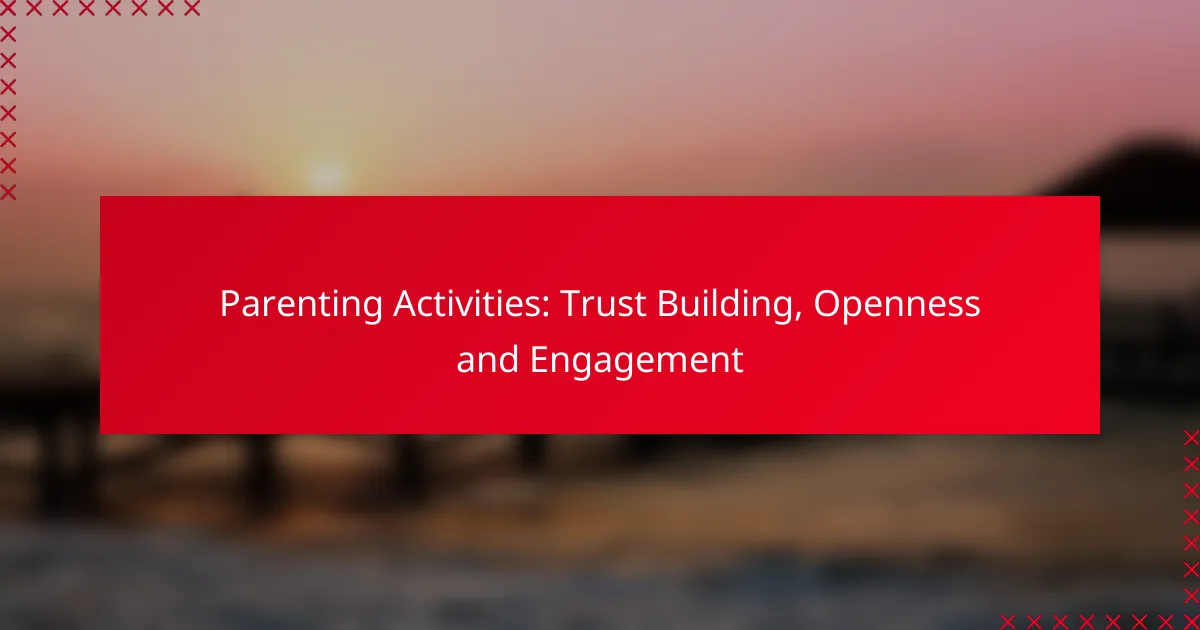Effective parenting activities play a crucial role in building trust and fostering openness between parents and children. By engaging in shared experiences and encouraging open communication, parents can create an environment where children feel safe to express their thoughts and feelings. These strategies not only enhance emotional security but also strengthen the overall parent-child relationship.

What are effective parenting activities for trust building?
Effective parenting activities for trust building focus on creating open communication and shared experiences. Engaging in these activities fosters a deeper connection between parents and children, enhancing trust and emotional security.
Family game nights
Family game nights are a fun way to build trust through teamwork and friendly competition. Choose games that require collaboration, such as cooperative board games or team-based video games, to encourage bonding.
Set a regular schedule for game nights, whether weekly or bi-weekly, to create anticipation and consistency. This routine helps children feel secure and valued in the family unit.
Open discussions about feelings
Encouraging open discussions about feelings allows children to express themselves and understand their emotions better. Create a safe space where everyone can share their thoughts without judgment.
Consider using prompts or questions to guide conversations, such as “What made you happy today?” or “How did you feel during that situation?” This practice not only builds trust but also enhances emotional intelligence.
Shared responsibilities in chores
Assigning shared responsibilities in chores promotes teamwork and accountability within the family. Involve children in age-appropriate tasks, such as setting the table or cleaning their rooms, to instill a sense of contribution.
Use a chore chart to track responsibilities and celebrate accomplishments together. This approach reinforces trust as children see their efforts recognized and appreciated.
Outdoor adventures together
Outdoor adventures, such as hiking or biking, provide opportunities for families to bond while enjoying nature. These activities encourage communication and teamwork, essential for building trust.
Plan outings that cater to everyone’s interests and abilities. Whether it’s a simple walk in the park or a more challenging hike, shared experiences in nature strengthen family ties and create lasting memories.
Storytelling sessions
Storytelling sessions allow families to share experiences and lessons learned, fostering trust through vulnerability. Encourage children to share their own stories or retell family anecdotes, creating a sense of belonging.
Make storytelling interactive by asking questions or prompting discussions about the stories shared. This practice not only enhances communication skills but also deepens emotional connections within the family.

How can parents foster openness with their children?
Parents can foster openness by creating an environment where children feel comfortable expressing their thoughts and feelings. This involves encouraging dialogue, actively listening, and ensuring that children know their opinions are valued.
Encouraging questions
Encouraging children to ask questions is essential for fostering openness. When children feel free to inquire about their surroundings, it promotes curiosity and deeper understanding. Parents can model this by asking open-ended questions themselves, which invites children to share their perspectives.
For example, instead of asking, “Did you have a good day?” parents can ask, “What was the best part of your day?” This approach encourages more meaningful conversations and helps children articulate their thoughts.
Active listening techniques
Active listening is crucial for parents to demonstrate that they value their children’s input. This involves giving full attention, maintaining eye contact, and responding appropriately to what the child says. Parents should avoid interrupting and instead reflect back what they hear to confirm understanding.
Techniques such as nodding, summarizing the child’s points, and asking follow-up questions can enhance the listening experience. For instance, if a child shares a concern, a parent might say, “It sounds like you’re feeling worried about that. Can you tell me more?”
Creating a safe space for sharing
Creating a safe space for sharing is vital for encouraging openness. This means establishing a non-judgmental atmosphere where children feel secure in expressing their feelings and thoughts. Parents should reassure their children that it’s okay to talk about anything without fear of criticism or punishment.
Setting aside regular family time, such as weekly discussions or game nights, can help reinforce this safe space. During these times, parents can emphasize that all feelings are valid, fostering a culture of openness and trust within the family.

What engagement strategies enhance parent-child relationships?
Engagement strategies that enhance parent-child relationships focus on building trust, openness, and active participation. These strategies create opportunities for meaningful interactions, fostering a deeper connection and understanding between parents and children.
Regular one-on-one time
Regular one-on-one time is essential for strengthening parent-child relationships. Setting aside dedicated time each week, even if it’s just 30 minutes, allows for focused conversations and shared experiences without distractions.
Consider activities that your child enjoys, such as playing a game, going for a walk, or cooking together. This personalized attention helps children feel valued and understood, reinforcing their trust in you.
Participating in school activities
Engaging in school activities demonstrates to your child that you value their education and interests. Attend parent-teacher conferences, school plays, or sports events to show your support and involvement in their academic life.
Being present at school functions not only boosts your child’s confidence but also allows you to connect with their peers and teachers, creating a supportive community around your child.
Volunteering together
Volunteering together can significantly enhance your bond with your child while instilling values of empathy and community service. Look for local opportunities, such as food banks, animal shelters, or community clean-up events, that you can participate in as a team.
Engaging in volunteer work helps children develop a sense of responsibility and teamwork, while also providing a shared experience that strengthens your relationship. Aim for at least one volunteering event each month to maintain this connection and commitment to giving back.

What are the benefits of trust-building activities?
Trust-building activities foster a secure environment where children feel valued and understood. These activities enhance relationships, leading to improved communication and emotional connections within families.
Improved communication skills
Engaging in trust-building activities encourages open dialogue between parents and children. When children feel safe, they are more likely to express their thoughts and feelings, leading to clearer communication.
Consider activities like family meetings or storytelling sessions, where everyone shares their perspectives. This practice not only improves verbal skills but also teaches active listening, which is crucial for effective communication.
Stronger emotional bonds
Trust-building activities create shared experiences that strengthen emotional ties. When families participate in fun and engaging tasks together, they develop a sense of belonging and mutual support.
Examples include team-building games or collaborative projects, which can range from cooking a meal together to working on a craft. These shared moments help children feel more connected to their parents, fostering a nurturing environment.
Increased confidence in children
Participating in trust-building activities can significantly boost a child’s self-esteem. When children see that their opinions are valued, they gain confidence in their abilities and judgments.
Activities that involve problem-solving or decision-making, such as planning a family outing, allow children to take initiative and feel empowered. This increased confidence can lead to better performance in school and social situations.

How do cultural differences impact parenting activities?
Cultural differences significantly influence parenting activities, shaping how trust, openness, and engagement are fostered within families. These variations can affect communication styles, expectations, and the overall approach to raising children.
Variations in family dynamics
Family dynamics can differ widely across cultures, affecting how parents and children interact. For instance, in collectivist cultures, families may prioritize group harmony and interdependence, leading to more cooperative parenting styles. In contrast, individualistic cultures often emphasize personal achievement and independence, which can result in more competitive family interactions.
Understanding these dynamics is crucial for parents, as they can impact children’s social development and emotional well-being. Parents should consider their cultural background and how it shapes their expectations and interactions with their children.
Different approaches to discipline
Cultural perspectives on discipline can vary greatly, influencing how parents enforce rules and expectations. Some cultures may favor authoritative approaches, where parents set clear rules and expect compliance, while others might adopt more permissive styles, allowing children greater freedom to explore and learn from their mistakes.
For effective discipline, parents should align their methods with their cultural values while remaining adaptable to their children’s needs. It’s essential to communicate openly with children about expectations and consequences, fostering an environment of trust and understanding.
